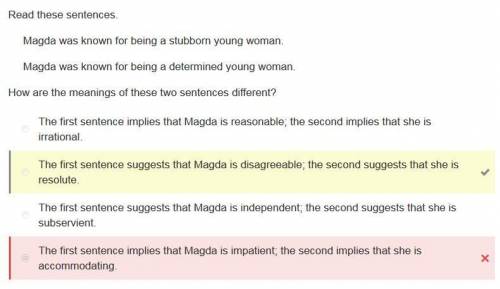
English, 27.06.2019 06:00 memester74
Read these sentences. magda was known for being a stubborn young woman. magda was known for being a determined young woman. how are the meanings of these two sentences different? the first sentence implies that magda is impatient; the second implies that she is accommodating. the first sentence suggests that magda is disagreeable; the second suggests that she is resolute. the first sentence suggests that magda is independent; the second suggests that she is subservient. the first sentence implies that magda is reasonable; the second implies that she is irrational.

Answers: 1
Another question on English

English, 21.06.2019 13:30
What might influence people’s perspectives? check all that apply.
Answers: 3

English, 22.06.2019 04:00
He leaned his head against the wall; his eyes were shut, his hands clasped in each other, and his body seemed to be sustained in an upright position merely by the cellar-door against which he rested his left shoulder. the lethargy into which he was sunk seemed scarcely interrupted by my feeling his hand and his forehead. his throbbing temples and burning skin indicated a fever . . there was only one circumstance that hindered me from forming an immediate determination in what manner this person should be treated. my family consisted of my wife and a young child. our servant-maid had been seized, three days before, by the reigning malady, and, at her own request, had been conveyed to the hospital. we ourselves enjoyed good health, and were hopeful of escaping with our lives. our measures for this end had been cautiously taken and carefully adhered to. they did not consist in avoiding the receptacles of infection, for my office required me to go daily into the midst of them; nor in filling the house with the exhalations of gunpowder, vinegar, or tar. they consisted in cleanliness, reasonable exercise, and wholesome diet. who is the story’s first-person narrator
Answers: 1


English, 22.06.2019 07:00
Which sentence in this excerpt from leo tolstoy’s the death of ivan ilyich shows the human tendency to contemplate one’s past life? "but if that is so," he said to himself, "and i am leaving this life with the consciousness that i have lost all that was given me and it is impossible to rectify it—what then? " he lay on his back and began to pass his life in review in quite a new way. in the morning when he saw first his footman, then his wife, then his daughter, and then the doctor, their every word and movement confirmed to him the awful truth that had been revealed to him during the night. in them he saw himself—all that for which he had lived—and saw clearly that it was not real at all, but a terrible and huge deception which had hidden both life and death. this consciousness intensified his physical suffering tenfold. he groaned and tossed about, and pulled at his clothing which choked and stifled him. and he hated them on that account. he was given a large dose of opium and became unconscious, but at noon his sufferings began again. he drove everybody away and tossed from side to side. his wife came to him and said: "jean, my dear, do this for me. it can't do any harm and often . healthy people often do it." he opened his eyes wide. "what? take communion? why? it's unnecessary! " she began to cry. "yes, do, my dear. i'll send for our priest. he is such a nice man." "all right. very well," he muttered. when the priest came and heard his confession, ivan ilyich was softened and seemed to feel a relief from his doubts and consequently from his sufferings, and for a moment there came a ray of hope. he again began to think of the vermiform appendix and the possibility of correcting it. he received the sacrament with tears in his eyes.
Answers: 2
You know the right answer?
Read these sentences. magda was known for being a stubborn young woman. magda was known for being a...
Questions


Computers and Technology, 30.07.2019 11:30

Business, 30.07.2019 11:30


Geography, 30.07.2019 11:30




Business, 30.07.2019 11:30








Mathematics, 30.07.2019 11:30

Chemistry, 30.07.2019 11:30

Biology, 30.07.2019 11:30




